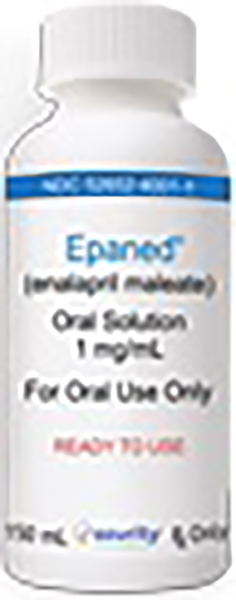Epaned (enalapril maleate) Oral Solution

Epaned (enalapril maleate) Oral Solution
ADDITIONAL IMPORTANT SAFETY INFORMATION
Contraindications:
EPANED is contraindicated in patients with a history of hypersensitivity related to previous treatment with an ACE inhibitor.
EPANED is contraindicated in patients with hereditary or idiopathic angioedema.
Do not co-administer aliskiren with EPANED in patients with diabetes.
EPANED is contraindicated in combination with a neprilysin inhibitor (e.g., sacubitril). Do not administer EPANED within 36 hours of switching to or from sacubitril/valsartan.
Warnings and Precautions:
Head and Neck Angioedema: Angioedema of the face, extremities, lips, tongue, glottis, and/or larynx, including some fatal reactions, have been reported in patients treated with ACE inhibitors, including EPANED, at any time during treatment. EPANED should be promptly discontinued and appropriate therapy and monitoring provided until complete and sustained resolution of signs and symptoms of angioedema has occurred. Patients with a history of angioedema may be at increased risk of angioedema while receiving an ACE inhibitor. ACE inhibitors have been associated with a higher rate of angioedema in Black than in non-Black patients.
Anaphylactoid Reactions: Sudden and potentially life-threatening anaphylactoid reactions have occurred in some patients dialyzed with high-flux membranes treated concomitantly with an ACE inhibitor. In such patients, dialysis must be stopped immediately, and aggressive therapy for anaphylactoid reactions must be initiated. In these patients, consideration should be given to using a different type of dialysis membrane or a different class of antihypertensive agent. Anaphylactoid reactions have also been reported in patients undergoing low-density lipoprotein apheresis with dextran sulfate absorption.Lifethreatening anaphylactoidreactions have been reported with concomitant ACE inhibitor and desensitizing treatment with hymenoptera venom.
Hepatic Failure: Rarely, ACE inhibitors have been associated with a syndrome that starts with cholestatic jaundice and progresses to fulminant hepatic necrosis and (sometimes) death. Patients who develop jaundice or marked elevations of hepatic enzymes should discontinue the ACE inhibitor and receive appropriate medical follow-up.
Hyperkalemia: Serum potassium should be monitored in patients receiving EPANED. Drugs that inhibit the renin-angiotensin system can cause hyperkalemia. Risk factors for the development of hyperkalemia include renal insufficiency, diabetes mellitus, and the concomitant use of potassium-sparing diuretics, potassium supplements, and/or potassium-containing salt substitutes.
Adverse Reactions:
Adverse Reactions (where rate on enalapril exceeds the rate on placebo by at least 0.2%) occurring in greater than 1% of patients with hypertension treated with enalapril in controlled trials include: fatigue, orthostatic effects, asthenia, cough, and rash. Adverse reactions reported in clinical trials of heart failure were similar to those seen in clinical trials for hypertension. In patients treated for heart failure, there was an increased incidence of hypotension and dizziness.
Drug Interactions:
In patients who are elderly, volume-depleted (including those on diuretic therapy), or with compromised renal function, use of non-steroidal anti-inflammatory agents (NSAIDs), including selective cyclooxygenase-2 (COX-2) inhibitors, with ACE inhibitors, including enalapril, may result in deterioration of renal function, including possible acute renal failure. Monitor renal function periodically in patients receiving enalapril and NSAID therapy.
Dual Inhibition of the Renin-Angiotensin System (RAS): Dual blockade of the RAS with angiotensin receptor blockers, ACE inhibitors, or aliskiren is associated with increased risks of hypotension, hyperkalemia, and changes in renal function, (including acute renal failure) compared to monotherapy. Closely monitor BP, renal function and electrolytes.
Avoid use of aliskiren with EPANED in patients with renal impairment.